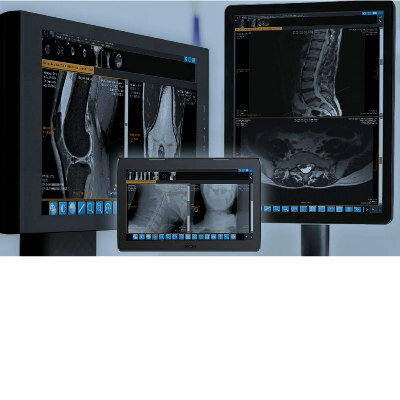Mobile 1.5 Tesla MRI System Brings High-Quality Diagnostic Imaging to Offsite Locations
|
By MedImaging International staff writers Posted on 29 Sep 2023 |

Healthcare providers need to continuously adapt to an ever-changing environment, making it a challenge for medical professionals to deliver faster and more effective care to patients wherever they may be. Now, a new mobile MRI scanner delivers high-quality care wherever the patients are while also offering healthcare practitioners the flexibility to decide where their MRI services are needed the most.
The MAGNETOM Viato.Mobile is a new 1.5 Tesla (1.5T) magnetic resonance (MR) imaging scanner from Siemens Healthineers (Erlangen, Germany) that is specifically engineered for mobile use, offering unprecedented flexibility in deploying MR imaging. Designed to fit into a trailer, it can be easily transported to remote areas, bringing advanced medical imaging to patients with serious health conditions who might otherwise have to travel great distances for such services. Additionally, the MAGNETOM Viato.Mobile can also serve as a long-term MRI solution at healthcare facilities that may not have the space or funding for building a shielded room for a fixed-magnet system.
What sets the MAGNETOM Viato.Mobile apart is its incorporation of advanced technologies originally developed for Siemens Healthineers' stationary MRI machines. One such technology, BioMatrix, allows for adjustments according to different patient anatomies and physiological traits, ensuring personalized and consistent MRI exams. Another feature, Deep Resolve, employs artificial intelligence to not just enhance image clarity and reduce background noise but also to significantly speed up the scanning process—cutting down the time for some brain scans by up to 70%. These functionalities collectively streamline the workflow for healthcare providers while also improving the patient experience.
Furthermore, the MAGNETOM Viato.Mobile is equipped with myExam Companion, a feature that offers tiered guidance levels to radiologic technologists during the MRI exam. This ensures that even those with varying levels of experience can capture high-quality images consistently. The device also comes with a wide array of high-performing MR coils aimed at patient comfort, quick and easy processes, and exceptional imaging quality. Among these are the BioMatrix Head/Neck 20 coil, adjustable for each patient; the BioMatrix Body 18 coil with a Beat Sensor, which expands imaging capabilities and enables comprehensive cardiovascular MRI scans without the need for electrocardiogram triggering; and the UltraFlex Small & Large 18 coils, designed for quick, high-res imaging. The MAGNETOM Viato.Mobile has now received approval from the U.S. Food and Drug Administration.
“The MAGNETOM Viato.Mobile demonstrates our dedication to the mobile MR market by offering the latest and greatest technologies to patients who might lack convenient access to premium diagnostic MR scanners,” said Jane Kilkenny, vice president of magnetic resonance at Siemens Healthineers North America. “The introduction of the MAGNETOM Viato.Mobile is yet another example of our efforts to democratize high-end imaging technology to provide greater access to care.”
Related Links:
Siemens Healthineers
Latest MRI News
- PET/MRI Improves Diagnostic Accuracy for Prostate Cancer Patients
- Next Generation MR-Guided Focused Ultrasound Ushers In Future of Incisionless Neurosurgery
- Two-Part MRI Scan Detects Prostate Cancer More Quickly without Compromising Diagnostic Quality
- World’s Most Powerful MRI Machine Images Living Brain with Unrivaled Clarity
- New Whole-Body Imaging Technology Makes It Possible to View Inflammation on MRI Scan
- Combining Prostate MRI with Blood Test Can Avoid Unnecessary Prostate Biopsies
- New Treatment Combines MRI and Ultrasound to Control Prostate Cancer without Serious Side Effects
- MRI Improves Diagnosis and Treatment of Prostate Cancer
- Combined PET-MRI Scan Improves Treatment for Early Breast Cancer Patients
- 4D MRI Could Improve Clinical Assessment of Heart Blood Flow Abnormalities
- MRI-Guided Focused Ultrasound Therapy Shows Promise in Treating Prostate Cancer
- AI-Based MRI Tool Outperforms Current Brain Tumor Diagnosis Methods
- DW-MRI Lights up Small Ovarian Lesions like Light Bulbs
- Abbreviated Breast MRI Effective for High-Risk Screening without Compromising Diagnostic Accuracy
- New MRI Method Detects Alzheimer’s Earlier in People without Clinical Signs
- MRI Monitoring Reduces Mortality in Women at High Risk of BRCA1 Breast Cancer
Channels
Radiography
view channel
Novel Breast Imaging System Proves As Effective As Mammography
Breast cancer remains the most frequently diagnosed cancer among women. It is projected that one in eight women will be diagnosed with breast cancer during her lifetime, and one in 42 women who turn 50... Read more
AI Assistance Improves Breast-Cancer Screening by Reducing False Positives
Radiologists typically detect one case of cancer for every 200 mammograms reviewed. However, these evaluations often result in false positives, leading to unnecessary patient recalls for additional testing,... Read moreUltrasound
view channel
Deep Learning Advances Super-Resolution Ultrasound Imaging
Ultrasound localization microscopy (ULM) is an advanced imaging technique that offers high-resolution visualization of microvascular structures. It employs microbubbles, FDA-approved contrast agents, injected... Read more
Novel Ultrasound-Launched Targeted Nanoparticle Eliminates Biofilm and Bacterial Infection
Biofilms, formed by bacteria aggregating into dense communities for protection against harsh environmental conditions, are a significant contributor to various infectious diseases. Biofilms frequently... Read moreNuclear Medicine
view channel
New SPECT/CT Technique Could Change Imaging Practices and Increase Patient Access
The development of lead-212 (212Pb)-PSMA–based targeted alpha therapy (TAT) is garnering significant interest in treating patients with metastatic castration-resistant prostate cancer. The imaging of 212Pb,... Read moreNew Radiotheranostic System Detects and Treats Ovarian Cancer Noninvasively
Ovarian cancer is the most lethal gynecological cancer, with less than a 30% five-year survival rate for those diagnosed in late stages. Despite surgery and platinum-based chemotherapy being the standard... Read more
AI System Automatically and Reliably Detects Cardiac Amyloidosis Using Scintigraphy Imaging
Cardiac amyloidosis, a condition characterized by the buildup of abnormal protein deposits (amyloids) in the heart muscle, severely affects heart function and can lead to heart failure or death without... Read moreGeneral/Advanced Imaging
view channel
New AI Method Captures Uncertainty in Medical Images
In the field of biomedicine, segmentation is the process of annotating pixels from an important structure in medical images, such as organs or cells. Artificial Intelligence (AI) models are utilized to... Read more.jpg)
CT Coronary Angiography Reduces Need for Invasive Tests to Diagnose Coronary Artery Disease
Coronary artery disease (CAD), one of the leading causes of death worldwide, involves the narrowing of coronary arteries due to atherosclerosis, resulting in insufficient blood flow to the heart muscle.... Read more
Novel Blood Test Could Reduce Need for PET Imaging of Patients with Alzheimer’s
Alzheimer's disease (AD), a condition marked by cognitive decline and the presence of beta-amyloid (Aβ) plaques and neurofibrillary tangles in the brain, poses diagnostic challenges. Amyloid positron emission... Read more.jpg)
CT-Based Deep Learning Algorithm Accurately Differentiates Benign From Malignant Vertebral Fractures
The rise in the aging population is expected to result in a corresponding increase in the prevalence of vertebral fractures which can cause back pain or neurologic compromise, leading to impaired function... Read moreImaging IT
view channel
New Google Cloud Medical Imaging Suite Makes Imaging Healthcare Data More Accessible
Medical imaging is a critical tool used to diagnose patients, and there are billions of medical images scanned globally each year. Imaging data accounts for about 90% of all healthcare data1 and, until... Read more
Global AI in Medical Diagnostics Market to Be Driven by Demand for Image Recognition in Radiology
The global artificial intelligence (AI) in medical diagnostics market is expanding with early disease detection being one of its key applications and image recognition becoming a compelling consumer proposition... Read moreIndustry News
view channel
Bayer and Google Partner on New AI Product for Radiologists
Medical imaging data comprises around 90% of all healthcare data, and it is a highly complex and rich clinical data modality and serves as a vital tool for diagnosing patients. Each year, billions of medical... Read more




















